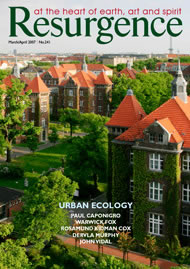FIRST LET ME declare an interest: my name listed on the acknowledgements page of this book. I am also grateful to George Monbiot for publicising in Heat an idea of mine about ‘smart’ domestic electricity meters, which would charge us according to the instantaneous marginal cost of electricity on the network. This, in a nutshell, is what Heat is about -– solutions to global warming. And in particular, how the rich nations that emit most of the world’s carbon dioxide and other greenhouse gases can cut those emissions by a whopping 90% – essential, in Monbiot’s view, if the world is to avoid catastrophic climate change within this century.
Cutting our greenhouse-gas emissions on this scale will need a profound transformation of our society and economy. Some of the changes are easy and profitable: replace a 100W incandescent light bulb with a 20W compact fluorescent costing £5, and you will save £100 in electricity over its 10,000-hour lifetime. But just how do you set about making the nation’s crumbling housing stock energy-efficient, a necessary step on the road to climatic redemption? First the Government must at least look like it means it: improving thermal standards in all newbuild; tackling the 10% of homes that have no insulation of any kind; and addressing fuel poverty amongst poor and older people.
Land transport is also crying out for attention, as the Government projects a 26% increase in traffic between 2000 and 2010. Efficient vehicles, such as the ‘hypercar’ promoted by Amory Lovins’ Rocky Mountain Institute, offer part of the solution. So does a new way of operating long-distance buses on major roads (see Resurgence 240, ‘Sensible Solutions’). What offers no solution, argues Monbiot, is the obsession with biofuels, “a formula not only for humanitarian disaster but for environmental catastrophe”, as Borneo’s forests are burnt for palm-oil plantations, releasing hundreds of times more carbon dioxide than the biofuels can ever save.
He swings a few other brickbats along his way. First in line is the climate change “denial industry” – the collection of industry-funded NGOs, glossy PR companies and pseudo-scientists who have mysteriously managed to convince the world’s media that their opinions constitute half of a debate over the reality of climate change – a debate entirely non-existent in the scientific community. This denial industry, he discovers, is one and the same as that which once poured cold water on the link between smoking and lung cancer.
Monbiot also attacks the ‘voluntary offset’ market – the companies who offer to plant trees, or fund energy projects, to soak up the carbon dioxide you are responsible for as you drive to work, or jet off to the Bahamas. He is right to denounce bad practice, but wrong to dismiss the industry as a whole. In likening carbon offsets to medieval indulgences, he misses the point that the money given to the best offset companies does fund excellent projects in non-industrialised countries that not only reduce poverty and greenhouse-gas emissions, but help to set developing economies on a lower-carbon path. So long as we do things like fly, drive cars and heat our homes, it is better to offset than not to.
I also feel that Monbiot’s faith in personal carbon rationing is misplaced. This approach has one benefit: that it would make people more aware of their climate impacts. But, for most people, juggling money is quite boring enough without suddenly having to deal with a whole new currency with its own accounts and swipecards. This one is strictly for the enthusiasts – about 1% of us at most.
But one idea in Heat that will gain momentum is that of ‘love miles’, analogous to the ‘food miles’ that are already part of the language. These are the miles we travel to be with far-flung friends and family, so feeding the aviation industry which is the world’s fastest-growing source of greenhouse gases. Monbiot offers no solutions: “long-distance travel, high speed and the curtailment of climate change are not compatible. If you fly, you destroy other people’s lives.” Now where are you off to this summer?







